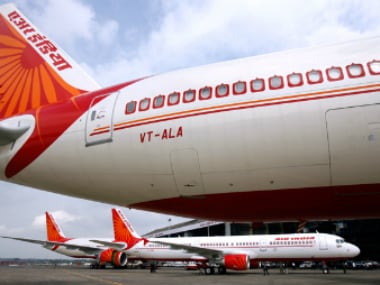VRS, ESOPs on the cards for Air India employees: Jayant Sinha
MoS (civil aviation) Jayant Sinha said the disinvestment is designed to ensure integrity and confidentiality at every stage of the Air India sale
New Delhi: The government will take a host of steps to protect the interests of Air India employees after the sale of a 76{f32dc76102757d19df9131cdc28115d9989856b4a44e5e08e1d600a023141750} stake in the national carrier, the details of which are being worked out in talks with staff unions, minister of state for civil aviation Jayant Sinha said in an interview.
The minister also said that the disinvestment, expected to be consummated by September, is designed to ensure integrity and confidentiality at every stage of the Air India sale.
The employee protection plans under consideration include a voluntary retirement scheme (VRS), an employee stock option (ESOP) scheme, a government-funded scheme to meet the medical expenses of retired employees and settlement of past dues from the merger of Air India and Indian Airlines.
“Now that the disinvestment process has kicked off, we have started formal negotiations with various worker unions including multiple pilot unions, cabin crew unions and engineers’ union. In consultation, we will determine the right level of protection and who should bear the cost. It is possible some employee protection cost may be provided by the government,” the minister said, adding that one example is the medical expense of retired employees.
The period of protection for employees from the date of consummation of the transaction as well as the terms of VRS will be given in the request for proposal (RFP).
“There are two parts to a VRS. One, how long the employee will be protected after the transaction closes legally. We are still a year away for the transaction to close. The second issue is the terms of the VRS. Those are some of the things we are looking at right now.” said Sinha.
Employees will be offered ESOPs from the government’s residual stake of 24{f32dc76102757d19df9131cdc28115d9989856b4a44e5e08e1d600a023141750}.
“The principle is that every employee should feel she has a significant material stake in the company’s future prospects,” the minister said.
The government will also settle the back wages of employees specified by a panel, amounting to Rs1,298 crore, prior to the transaction. The minister said that Air India’s head count of about 11,000 permanent employees is within industry standards. About 37.6{f32dc76102757d19df9131cdc28115d9989856b4a44e5e08e1d600a023141750} of employees will be retiring in the next five years, Sinha said, adding that it would not be correct to say that employee cost of Air India is in any way out of line with industry benchmarks.
Policymakers have taken special care to ensure that the divestment process is above criticism. “There is sufficient oversight at every stage by different committees so that both the integrity and confidentiality of the process is fully protected at all times,” said Sinha. Although an independent valuer will give a reserve price for the Air India stake on sale, it will be kept confidential from everyone till the bids are open, as is the standard practice.
“Reserve prices are never made public before bids are open. It is illogical to do so,” a former secretary to the government, who has headed the disinvestment department, said on condition of anonymity.
Sinha clarified that only interest-bearing debt of Rs24,576 crore will remain with the companies after the stake sale. This was decided based on the sustainability of the enterprise going forward, what is backed up by collateral and what is fair for the successful bidder to hold.
Sinha also said that any non-aviation company meeting the eligibility criteria could also bid for the company. “Air India has the expertise to run an airline as it does today. What we need is an investor with the necessary management and financing expertise,” he added.
Industry watchers said disinvestment is likely to make the national carrier more competitive. “Privatization is likely to improve operational efficiency of Air India, thereby helping it compete more effectively and help build sustainable profitability,” said Kinjal Shah, vice-president of corporate ratings at credit rating agency Icra Ltd.
The government is also on a massive infrastructure expansion programme in line with the growth in air travel. “Today people are taking 250 million trips a year. We are planning for a billion trips a year over the next 15-20 years and various experts have indicated that the investments needed for it would be about Rs3-4 trillion,” said Sinha.


